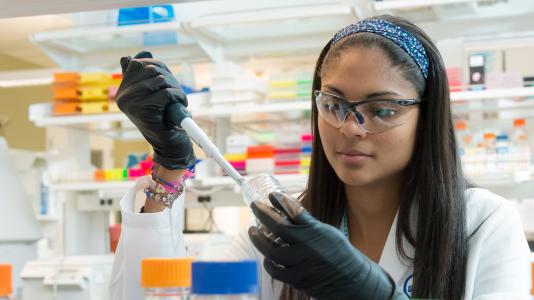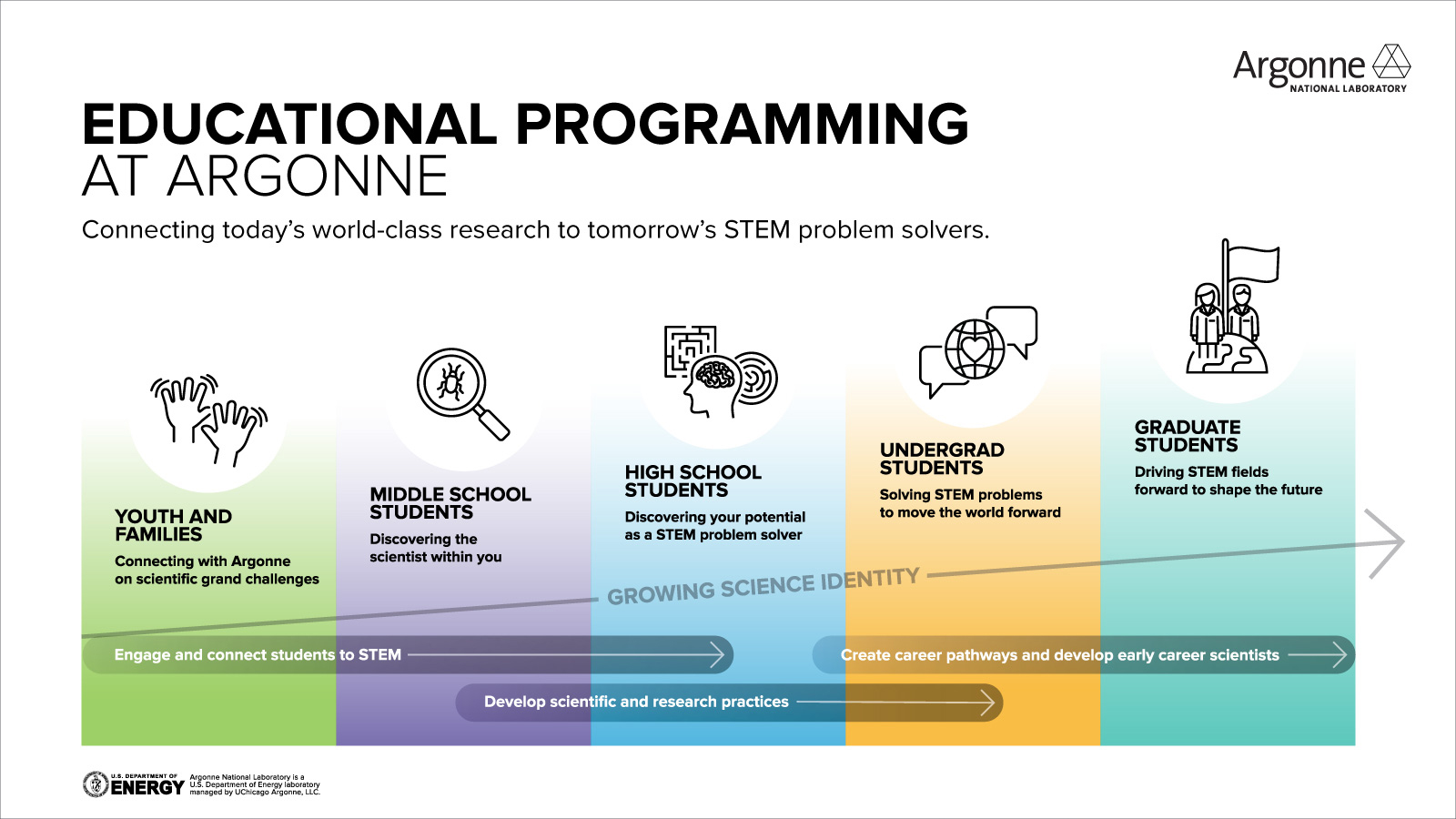
This year millions of students across America will make the leap from the world of study to the world of work.
To help sustain and encourage students along their journey, and better prepare them for the scientific challenges that lie ahead, the U.S. Department of Energy’s (DOE) Argonne National Laboratory provides educational opportunities to students across all stages of the pipeline. Argonne offers these opportunities, which ultimately enhance U.S. prosperity, in collaboration with other national laboratories, the University of Chicago, and schools around Chicago and the nation.
Through its educational programming, Argonne connects with over 35,000 students, teachers and families each year. Argonne’s Educational Programs and Outreach Department leads opportunities including competitions, outreach events, camps, conferences and internships. Education at Argonne is connected by a common thread: the desire to help students develop their scientific identity.
“If students early on can do the things that scientists do, like develop and test ideas, they can grow their identity as a scientist. The stronger their identity, the more likely they are to sustain themselves through the pipeline,” said Meridith Bruozas, head of Argonne Educational Programs and Outreach.
Activities at the laboratory help nurture students’ scientific identity by giving them a chance to think and solve problems like a scientist, interact with scientists at Argonne and see the real-world problems they work on every day.
(Image by Argonne National Laboratory.)
Inspiring our youth
Argonne’s youth and families programs get students excited about ideas related to Science, Technology, Engineering and Mathematics (STEM).
Some of Argonne’s outreach events include having scientists physically or virtually visit classrooms. Others, known as STEM Fests, are organized by schools, libraries and community organizations. At STEM Fests, Educational Programs brings hands-on STEM activities for parents and their children to try and showcases the research Argonne does.
Families learn about Argonne through the laboratory’s many middle school, high school and collegiate competitions. These include an electric car competition and regional science bowl for middle school students, an autonomous vehicle competition for high school students and the DOE’s CyberForce CompetitionTM, sponsored by its Office of Cybersecurity, Energy Security, and Emergency Response. Competitions take elements of Argonne’s science and build challenges around them. In these challenges, students act as STEM problem solvers while doing fun activities, like build and race a miniature vehicle.
“The competitions raise the bar for the education community as a whole. By putting a challenge out there, we invite communities to try something they may not have done before, like build a robot,” Bruozas said.
The chance to try something out-of-the-box is what attracted Kim Turnbull to Argonne’s Autonomous Vehicle Competition. Turnbull, a chemistry teacher at Mother McAuley Liberal Arts High School, first heard about the competition while searching for ways to expand her school’s technology offerings. Previous attempts at offering a technology related course had failed to attract significant student interest.
“We knew many of our girls were going off to college pursuing degrees in STEM and that some knowledge of computer science and technology is needed for those fields, so the challenge for us was in figuring out how to promote coding and computer science in a way that would be fun and creative,” Turnbull said.
Argonne’s autonomous vehicle competition became part of their solution.
Turnbull led a team of students in the competition last year and has another team competing this year. To participate, students have to first design and build their cars prior to the competition. On the day of, a maze-like obstacle course is revealed and teams must then program their vehicle to navigate through it.
“Parents were amazed at what their students were able to do, all six went in with no coding knowledge at all, and came out with a good understanding of the basics, and were able to complete the course,” she said.
Sprinting through middle school
Along with outreach, Argonne develops enrichment experiences that immerse middle school classrooms in science for a day. The experiences are known as learning labs.
Learning labs are hosted in Argonne’s Learning Center, a unique space comprised of student labs, classrooms and a computer lab that sits inside the control room of one of the first high-energy particle accelerators in the world. Around 4,000 students and teachers connect with the learning center each year, through learning labs, camps and research opportunities.
Each learning lab is shaped not just by the areas of research Argonne pursues, but also by the way researchers go about their work in those areas. A lab on batteries, for example, employs the same sprint approach used by research teams at the Joint Center for Energy Storage Research (JCESR), a battery innovation hub led by Argonne and funded by the DOE Office of Science, Basic Energy Sciences Program.
The sprint approach breaks down a single big question into a series smaller questions that are then handed off to small multidisciplinary teams to answer over a short period of time. Once the sprint is complete, teams convene with the larger community to share their findings, fueling a new cycle of questioning that moves the needle forward.
“Of course our learning labs leverage knowledge about batteries or X-rays for example, but the main focus is not on the facts, but on the skills and practices a scientist needs to solve problems in those areas successfully,” said Education Outreach Supervisor John Domyancich.
Branching out in high school
Transitioning from middle school to high school opens up more opportunities for students to practice and implement scientific skills. To help them further develop these abilities, Argonne hosts numerous programs, including summer coding camps and All About Energy, a six-week program for Chicago high school students.
In All About Energy, students develop a deep understanding of sustainable energy by working to create their own sustainability plans for various neighborhoods in Chicago. Argonne runs the program in partnership with the University of Chicago’s Neighborhood School Program, and After School Matters, a non-profit that supports Chicago Public School high school students.
High school senior Gavin Atack took part in the program last year. The plan Atack and his team came up with included a community garden to increase food access and a plan to build solar panels using profits from the community garden.
“Going through the program you get to see just how many different ways there are to tackle issues with sustainability,” Atack said. “The most important thing I learned was how to collaborate with other people, to coming to an agreement as a group and to think of the best ways to integrate our ideas.”
Along with doing research, students take part in field trips to Argonne. At Argonne, Atack and his peers toured one of Argonne’s LEED-certified buildings and the supercomputers at the Argonne Leadership Computing Facility, a DOE Office of Science User Facility.
Science in the summer
Argonne also prepares undergraduate and graduate students to become early career scientists through internships.
Over 900 undergraduate and graduate students have appointments at the lab each year. Among the most popular is the DOE Office of Science’s Summer Undergraduate Laboratory Internship (SULI), which attracts around a hundred students to Argonne each year.
In this program, interns live on campus while learning directly from Argonne’s world-class researchers. In addition to doing real-world science and receiving mentorship, interns also receive professional development support, through seminars that teach them how to present their work, communicate and network.
For intern Jeriann Beiter, a recent graduate of Rochester Institute of Technology, meeting the research community and seeing how they work is among the highlights of her experience thus far.
“It’s been really cool to see how a research community comes together to solve these big problems,” she said. “There’s a lot of different seminars, colloquiums and presentations where I’ve seen how people work together to start new collaborations and projects that can advance mutual research interests.”
There’s diversity not just in the disciplines that come together but also in the resources, Beiter adds. The supercomputing capabilities at the Argonne Leadership Computing Facility is just one example.
“Along with having people here who are helpful, there’s so many resources available to allow you study just about anything,” she said.
The SULI program is sponsored and managed by DOE’s Office of Science.
Argonne National Laboratory seeks solutions to pressing national problems in science and technology. The nation’s first national laboratory, Argonne conducts leading-edge basic and applied scientific research in virtually every scientific discipline. Argonne researchers work closely with researchers from hundreds of companies, universities, and federal, state and municipal agencies to help them solve their specific problems, advance America’s scientific leadership and prepare the nation for a better future. With employees from more than 60 nations, Argonne is managed by UChicago Argonne, LLC for the U.S. Department of Energy’s Office of Science.
The U.S. Department of Energy’s Office of Science is the single largest supporter of basic research in the physical sciences in the United States and is working to address some of the most pressing challenges of our time. For more information, visit https://energy.gov/science.
